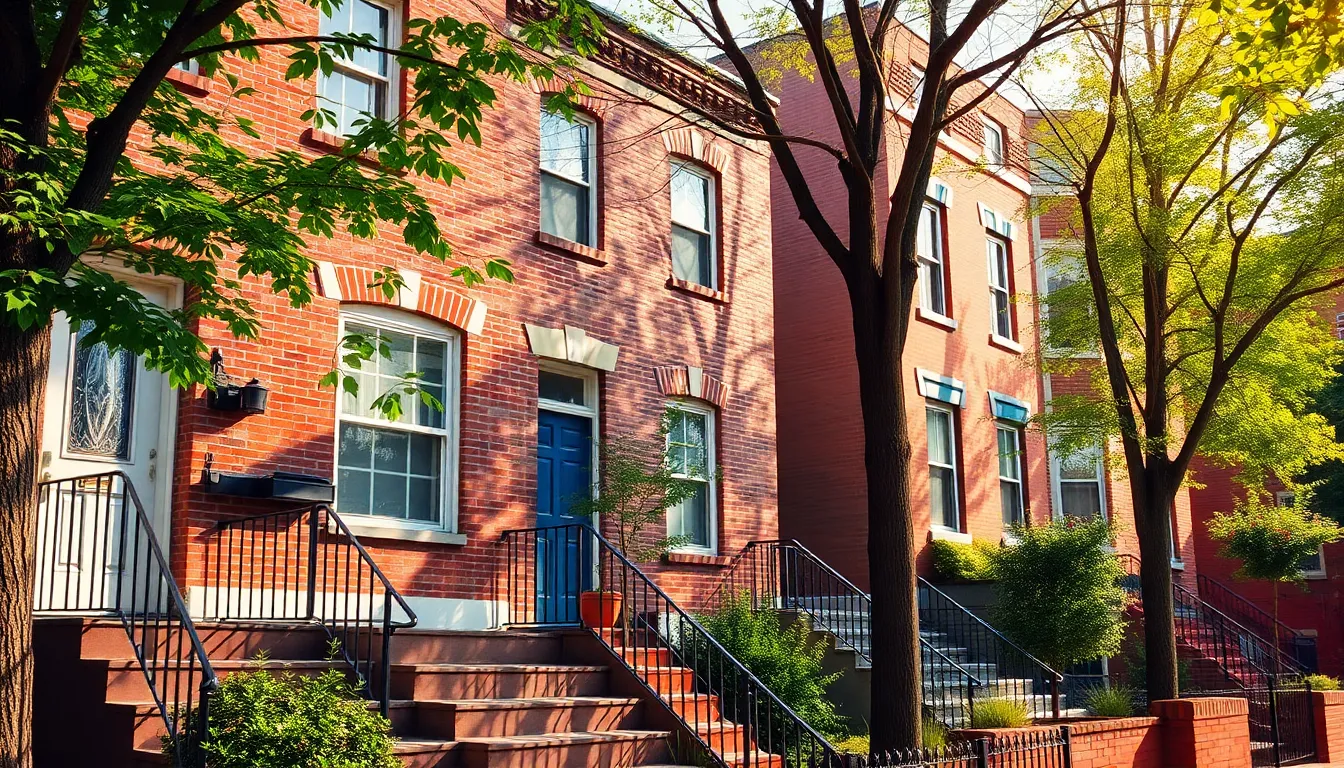Table of Contents
ToggleNavigating the labyrinth of Baltimore City property taxes can feel like trying to find a parking spot at Camden Yards on game day—frustrating and a little chaotic. Whether you’re a first-time homeowner or a seasoned real estate mogul, understanding these taxes is crucial for keeping your budget in check. After all, nobody wants to be surprised by a bill that feels like it came straight from the depths of the Inner Harbor.
Overview of Baltimore City Property Taxes
Baltimore City imposes property taxes on real estate, which significantly contributes to local funding. Annually, property owners receive a tax bill calculated based on the property’s assessed value. The assessment process may include various factors such as location, improvements, and property type.
Rates vary according to the property’s classification. Residential properties are assessed differently than commercial buildings. For the 2023 fiscal year, the tax rate for residential properties in Baltimore City stands at $2.248 per $100 of assessed value. Commercial properties face a higher rate of $2.909 per $100 of assessed value.
Property taxes cover essential services, including public education, infrastructure maintenance, and emergency services. Revenue collected supports thousands of employees in public services. Understanding the allocation of these funds helps property owners see the broader impact of taxes on the community.
Homeowners may apply for property tax credits to help manage costs, such as the Homeowners’ Tax Credit Program. This program assists low-income homeowners, aiming to alleviate tax burdens. Additionally, various grants offer more financial support for property improvements.
Discrepancies may arise in assessments, prompting property owners to appeal. The appeal process allows individuals to contest their property’s assessed value. Gathering evidence and documentation strengthens the case during an appeal.
Investors and homeowners alike need to stay informed about property tax trends and policies. Notably, changes in legislation can directly impact tax rates and assessment practices. Regularly reviewing tax liabilities ensures property owners remain prepared for upcoming financial responsibilities.
How Baltimore City Property Taxes Are Calculated

Property taxes in Baltimore City rely heavily on the assessed value of properties. This assessment determines the tax burden homeowners and real estate investors face.
Assessment Process
Assessments occur approximately every three years. Property owners receive a notice detailing their property’s assessed value. The City’s Department of Assessments and Taxation evaluates properties based on market conditions and characteristics. Adjustments reflect improvements or changes that influence market value. Property owners can contest assessments if they believe the valuation is inaccurate. To appeal, they must file within the designated timeframe, ensuring their case is heard.
Tax Rates
Baltimore City employs different tax rates for residential and commercial properties. For the 2023 fiscal year, residential property tax stands at $2.248 per $100 of assessed value. Conversely, commercial properties face a higher rate of $2.909 per $100. These rates fund essential services like public education and emergency response. Taxpayers should remain vigilant regarding potential changes in property values and rates, as these can impact overall tax liabilities. Understanding these nuances aids in effective financial planning for property owners.
Exemptions and Deductions
Understanding available exemptions and deductions can significantly reduce property tax liabilities in Baltimore City. Homeowners should explore these options to maximize their savings.
Homestead Property Tax Credit
The Homestead Property Tax Credit offers financial relief for homeowners by limiting the assessment increase on their primary residence. Eligible homeowners can benefit from a cap of 10% on assessment increases, which helps in stabilizing annual property tax bills. To qualify, homeowners must occupy the property as their principal residence and apply through the Maryland State Department of Assessments and Taxation. Additionally, this credit remains in effect as long as the property remains the owner’s primary residence.
Other Available Exemptions
Numerous other exemptions exist to further assist property owners in Baltimore City. The Disabled American Veterans Property Tax Exemption reduces tax liabilities for qualifying veterans by exempting a portion of their property’s value. Additionally, the Local Government Property Tax Exemption provides relief for certain nonprofit organizations that meet specific criteria. Homeowners aged 65 and older may qualify for the Senior Tax Credit, which offers further financial assistance based on income and property value. These exemptions can significantly alleviate the financial burden imposed by property taxes.
Payment Options and Deadlines
Understanding payment options and important deadlines aids property owners in managing their Baltimore City property taxes effectively. Multiple methods exist for making payments, and keeping track of deadlines ensures compliance.
Payment Methods
Property owners can choose from several payment methods for Baltimore City property taxes. Online payments provide convenience, allowing users to pay via the city’s official website. Automatic bank draft options enable users to schedule recurring payments, simplifying the tax management process. Additionally, homeowners can pay by mail using a check or money order sent to the designated tax office. In-person payments at designated city offices or authorized payment locations offer another alternative, though hours may vary by location.
Important Dates to Remember
Key deadlines play a critical role in property tax management. The first installment of property taxes generally falls due on July 1 each year. A second installment usually occurs by January 1. Property owners opting for a payment plan must enroll during specific enrollment periods outlined by the city. Tax bills typically get mailed out in May, providing a clear timeline for property owners to prepare. Failing to meet payment deadlines can result in penalties or interest fees that impact overall tax liabilities.
Consequences of Non-Payment
Non-payment of property taxes in Baltimore City triggers significant repercussions. Property owners may encounter late fees, which accrue monthly and increase the financial burden. Accumulated tax debts can lead to property liens, offering the city a legal claim against the property until the owed taxes are settled.
Facing potential foreclosure becomes a reality for those who continue to neglect tax obligations. Once the city initiates foreclosure proceedings, property owners risk losing their home or investment. Affected individuals may also experience adverse effects on their credit scores, which can hinder future borrowing opportunities.
The city offers a grace period of 60 days for property tax payments. However, after this timeframe, penalties begin to apply. Accessing tax credits or exemptions may become difficult if tax accounts remain unpaid, restricting available financial relief options in the future.
Local authorities keep track of unpaid taxes, creating a public record of the delinquencies. Property owners cannot overlook that these records can affect their reputation within the community. Resolving outstanding balances promptly prevents further complications and maintains good standing with local regulations.
Property owners must stay informed about their obligations to prevent these consequences. Seeking financial counseling or advice on managing tax liabilities can provide clarity on available options. Addressing issues early and comprehensively ensures financial responsibilities are met and peace of mind is maintained.
Conclusion
Navigating property taxes in Baltimore City requires diligence and awareness. Understanding the assessment process and available exemptions can significantly ease financial burdens for homeowners. By staying informed about deadlines and payment options, property owners can avoid penalties and manage their tax liabilities effectively.
Exploring tax credits and grants is essential for maximizing savings and ensuring compliance. With the right knowledge and resources, property owners can not only fulfill their obligations but also secure a stable financial future in Baltimore City. Staying proactive in monitoring tax trends and legislative changes will empower them to make informed decisions regarding their properties.




